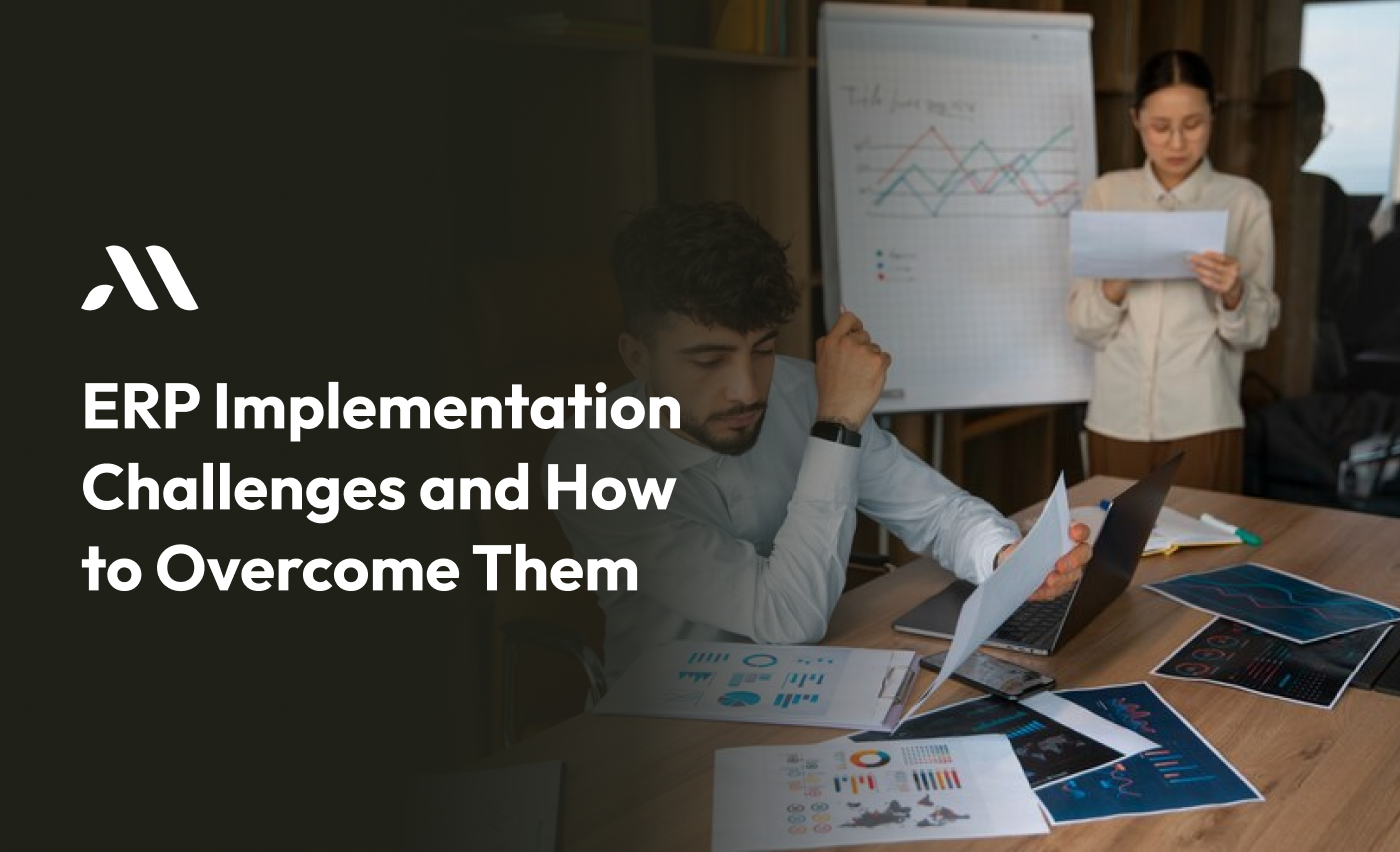Introduction
ERP (Enterprise Resource Planning) systems help businesses manage many things, like money, employees, and customers, all in one place. But getting an ERP system up and running can be tough. These are called ERP Implementation Challenges. If you are a business owner thinking about ERP implementation, it’s important to know what challenges you might face and how to handle them.
Common ERP Implementation Challenges
1. Lack of Clear Goals
One of the biggest ERP Implementation Challenges is not having clear goals. When you start, everyone in your company should know why you are using the ERP system and what it will do for you.
Tip: Write down what you want the ERP system to help with, like making work faster or keeping track of money better. When you know what you need, your ERP system will work better.
Remember: Without clear goals, it’s like building a house without a plan. You may end up spending more time and money fixing mistakes later.
2. Poor Planning
Planning is key in any ERP Implementation. Many businesses rush to get the ERP system going, but this can lead to mistakes. Poor planning can cause delays, extra costs, and a lot of frustration.
“Good planning is half the battle. A poorly planned ERP system is like a car with no map.”
Note: Planning should include knowing how much time and money you’ll need, what features are important, and how you’ll train your staff. A Custom ERP Development Company can help make sure you plan correctly and get the system that fits your business.
3. Lack of Training
A common ERP Implementation Challenge is not teaching your team how to use the system. Even the best ERP system won’t help if your staff doesn’t know how to use it.
According to Statista research, 50% of ERP implementations fail because users don’t know how to use the system properly.
Tip: Plan for training sessions where your employees can learn how to use the ERP system. The better they understand it, the more successful your ERP implementation will be.
Remember: Training is an investment. A well-trained team will save time and reduce mistakes later on.
4. Data Migration Problems
When you switch to an ERP system, you have to move all your old data (like customer lists, sales numbers, etc.) into the new system. This is called data migration. If it’s not done right, it can cause major ERP Implementation Challenges.
Note: Make sure you clean up your data before moving it. Get rid of old, incorrect, or duplicate data. This will make your ERP system run smoother.
Tip: Work with a Custom ERP Development Company that has experience in data migration. They can help you avoid losing important data or causing system errors.
5. Underestimating the Time Needed
Many business owners think ERP implementation will be quick, but it often takes more time than expected. If you rush it, you may face errors and problems down the road.
Remember: Good things take time. Rushing an ERP implementation can lead to bigger problems and higher costs later.
According to CB Insights, Nearly 60% of ERP projects take longer than planned due to underestimating the time required.
Tip: Create a realistic timeline with milestones. Break the project into smaller steps so that you can see progress and fix any issues as they come up.
6. High Costs
Implementing an ERP system can be expensive. Many businesses struggle with the high costs, especially if they don’t budget correctly.
Note: Always have a buffer in your budget for unexpected expenses. The cost of an ERP implementation can sometimes be 25% higher than what was planned due to unforeseen challenges.
Tip: Working with a Custom ERP Development Company can help you manage costs. They can create a system tailored to your needs, which may save you money in the long run by avoiding unnecessary features.
7. Resistance to Change
Change can be scary for employees. When you introduce a new ERP system, some people might not like it and resist using it. This is one of the common ERP Implementation Challenges.
“People fear what they don’t understand. Make them understand the benefits, and they’ll be more willing to accept the change.”
Involve your employees from the start. Let them know why the change is happening and how it will make their work easier. You can even get their input on which features will help them the most.
8. Integration Issues
Sometimes the new ERP system doesn’t work well with your old systems, causing integration issues. This is another ERP Implementation Challenge that can slow down your business.
Tip: Before starting, list out all the systems that need to work with the new ERP system. Share this list with your Custom ERP Development Company so they can ensure everything works smoothly.
Remember: If your ERP system can’t communicate with your other tools, you’ll lose time trying to fix these issues.
9. Lack of Vendor Support
Many business owners face ERP Implementation Challenges because their vendor doesn’t offer enough support. You need good support to solve problems quickly and keep things running smoothly.
Tip: Choose a vendor or a Custom ERP Development Company that provide ongoing support. Make sure they have a reputation for helping clients quickly and effectively when issues come up.
Remember: Support is crucial. Without it, small problems can turn into big ones, causing delays and frustration.
10. Customization Challenges
Sometimes, the basic ERP system doesn’t meet all your business needs. Customization can help, but it also brings challenges. Customizing too much can slow down the project and increase costs.
Note: Only customize your ERP system when it’s necessary. A Custom ERP Development Company can help you find the balance between using standard features and adding custom ones.
Tip: Focus on what you need. Avoid adding too many unnecessary custom features that could complicate your system.
Also Read - Role of ERP in Supply Chain Management - Complete Guide
How to Overcome ERP Implementation Challenges
- Set Clear Goals – Know what you want from the ERP system. Write down your goals and share them with your team.
- Plan Well – Take the time to create a detailed plan that includes timelines, budgets, and training.
- Train Your Team – Make sure your employees know how to use the system. Offer training sessions and support.
- Migrate Data Carefully – Clean up your data before moving it to the ERP system. This will prevent errors and slowdowns.
- Create Realistic Timelines – Don’t rush the process. Set a timeline that gives you enough time to handle any problems.
- Manage Costs – Work with a Custom ERP Development Company to keep costs under control and avoid surprises.
- Involve Your Team – Let your employees know about the changes and how the new ERP system will help them.
- Ensure Integration – Check that your ERP system will work smoothly with your current systems.
- Choose the Right Vendor – Pick a vendor or Custom ERP Development Company that offers good support during and after the implementation.
- Avoid Too Much Customization – Keep your system simple and only customize it when necessary.
Conclusion
ERP systems can help your business run smoothly, but getting them set up comes with its own set of ERP Implementation Challenges. By planning well, involving your team, and working with a Custom ERP Development Company, you can overcome these challenges and make your ERP system a success.
Looking to overcome ERP challenges? MicraSol can help! We specialize in custom ERP solutions tailored to your business. Our team ensures smooth implementation, data migration, and expert support every step of the way. Let’s simplify your ERP journey. Contact MicraSol today for a free consultation!
Bonus Tip: An ERP system is a big investment, but when done right, it can save you time, money, and effort in the long run.
FAQS
Why is ERP implementation challenging?
ERP implementation can be tough because it involves big changes, moving data, training employees, and making sure everything works together smoothly. Without good planning, it can get expensive and take longer than expected.
How long does ERP implementation take?
ERP implementation can take several months, depending on how big your business is and what you need the system to do. It’s important to create a realistic timeline and not rush the process to avoid mistakes.
What happens if we don’t train our employees on the ERP system?
If your employees don’t know how to use the ERP system, it can cause problems like delays and mistakes. Proper training is key to making sure the system works well for everyone.
How can I avoid mistakes with data migration?
To avoid problems, clean up your data before moving it to the new ERP system. Get rid of old or incorrect data, and work with experts who know how to handle data migration.
How much does ERP implementation cost?
The cost of ERP implementation depends on your business size and needs. Always plan for extra costs because sometimes unexpected issues come up, making the project more expensive.








